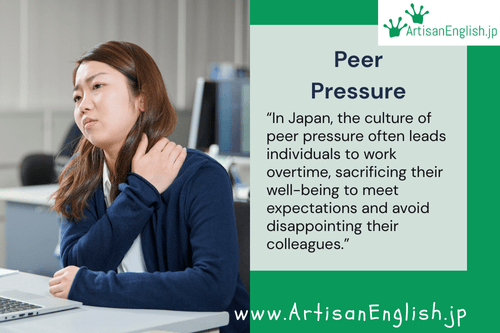
YouTube / iTunes / Spotify / Radio Public / Pocket Casts / Google Podcasts / Breaker / Overcast
Listen to ArtisanEnglish.jp posts & lesson intros here.
WotD: Peer pressure
I’ve lived in Japan for more than two decades and am still impressed with the social order and safety I enjoy here.
From what I’ve observed, one of the main ways Japan maintains such strict order is through extreme peer pressure.
In simple terms, peer pressure is the influence that individuals from the same age group or social circle exert on one another.
These influences push people to behave in specific ways, whether positively or negatively.
In Japan, peer pressure has a significant role in maintaining societal stability and safety.
In Japanese culture, the concept of harmony is fundamental.
People often need to conform to the expectations of their friends, family, and employers.
This is where peer pressure becomes a key factor.
For example, students may feel pressured by their classmates to study hard or participate in group activities.
This pressure helps foster a strong sense of community and support among peers.
Similarly, in the workplace, employees may experience peer pressure to work longer hours or contribute to team projects in a specific way.
Such extrinsic motivation drives people to give their best.
Unfortunately, this doesn’t lead to a highly efficient work environment.
However, peer pressure aligns individual goals with the group’s objectives.
Conformity benefits the whole of Japanese society.
The family also plays a crucial role in reinforcing peer pressure.
Parents may encourage their children to meet the expectations of their friends or relatives.
This familial influence can help maintain the values and traditions essential to Japanese identity.
Peer pressure is a powerful force in Japan that enforces social cohesion.
By encouraging cooperation and adherence to societal norms, peer pressure helps maintain safety and stability in daily life.
Understanding this concept will help foreigners more easily adjust to living in Japan.
Flesch-Kincaid Readability Test
This post is understandable by someone with at least a 9th-grade education (age 15).
On the Flesch-Kincaid reading-ease test, this post scores 50.
The easier a passage is to read, the higher the score on a scale of 0 – 100.

